14-15学年高中英语(人教新课标,必修一)课件:Unit 2 English around the world Reading(共38张PPT)
文档属性
| 名称 | 14-15学年高中英语(人教新课标,必修一)课件:Unit 2 English around the world Reading(共38张PPT) |  | |
| 格式 | zip | ||
| 文件大小 | 7.4MB | ||
| 资源类型 | 教案 | ||
| 版本资源 | 人教版(新课程标准) | ||
| 科目 | 英语 | ||
| 更新时间 | 2014-09-15 18:24:51 | ||
图片预览

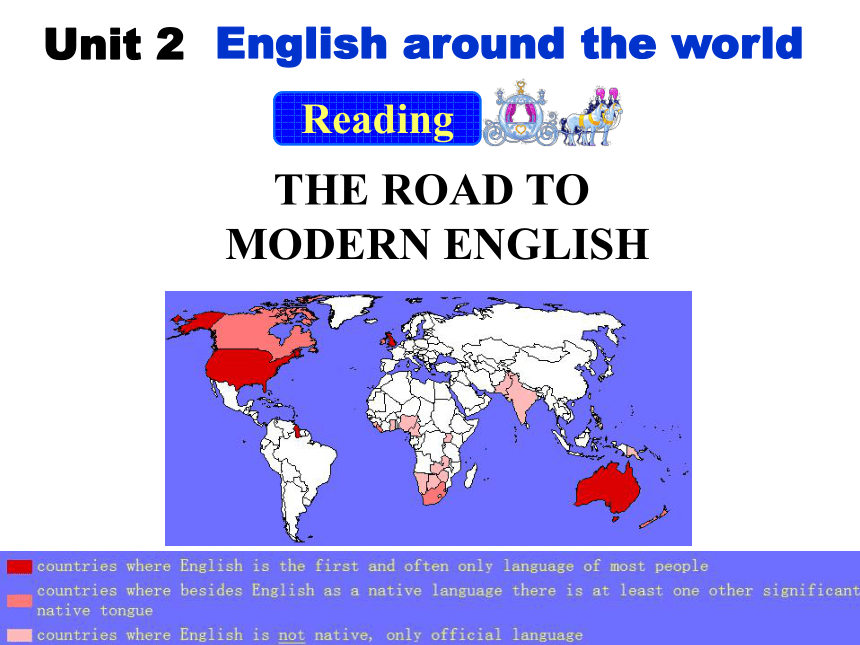
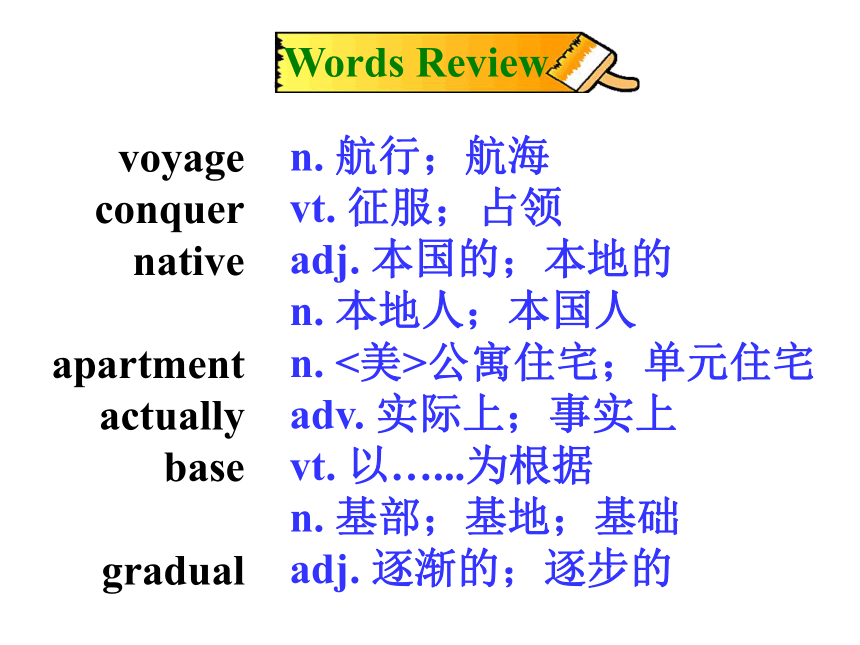
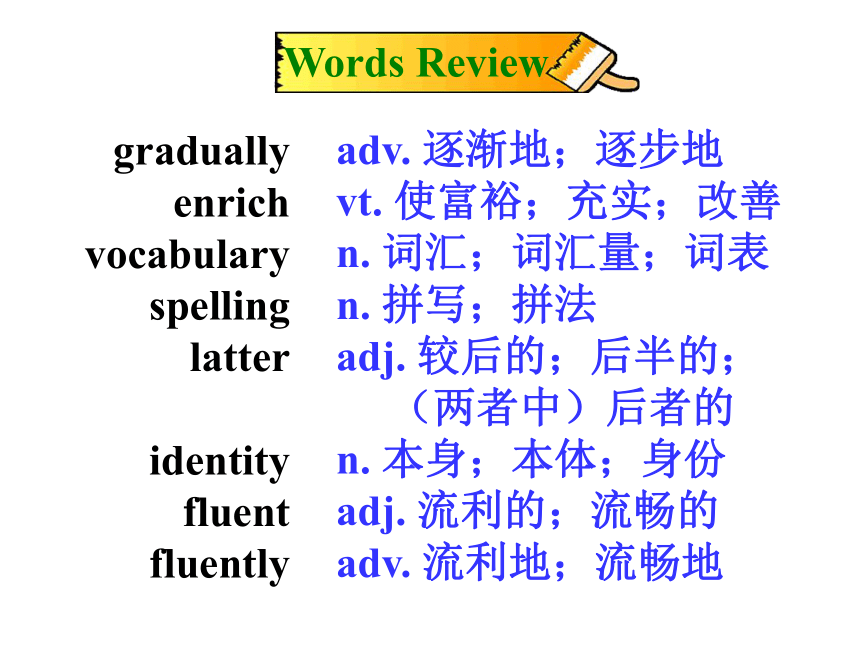
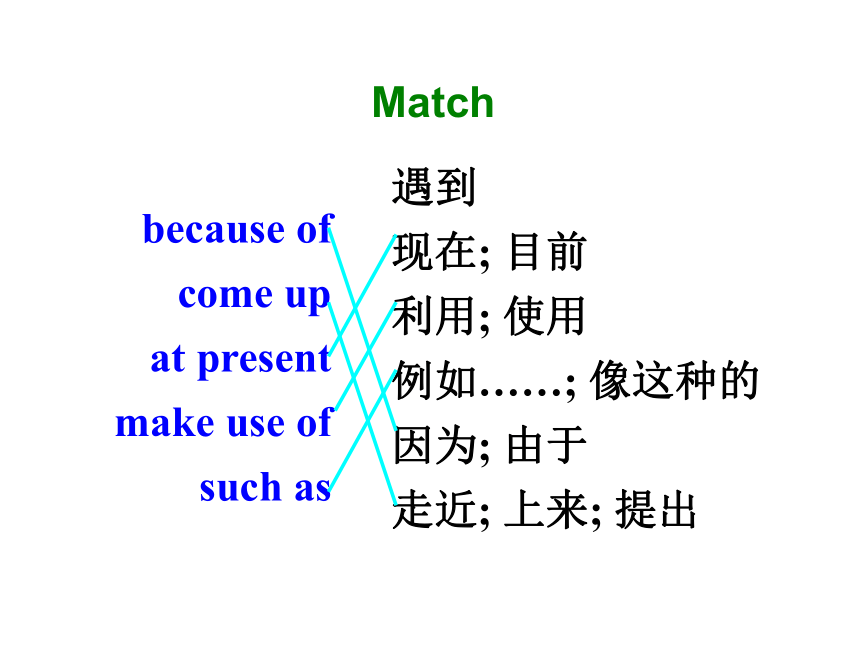
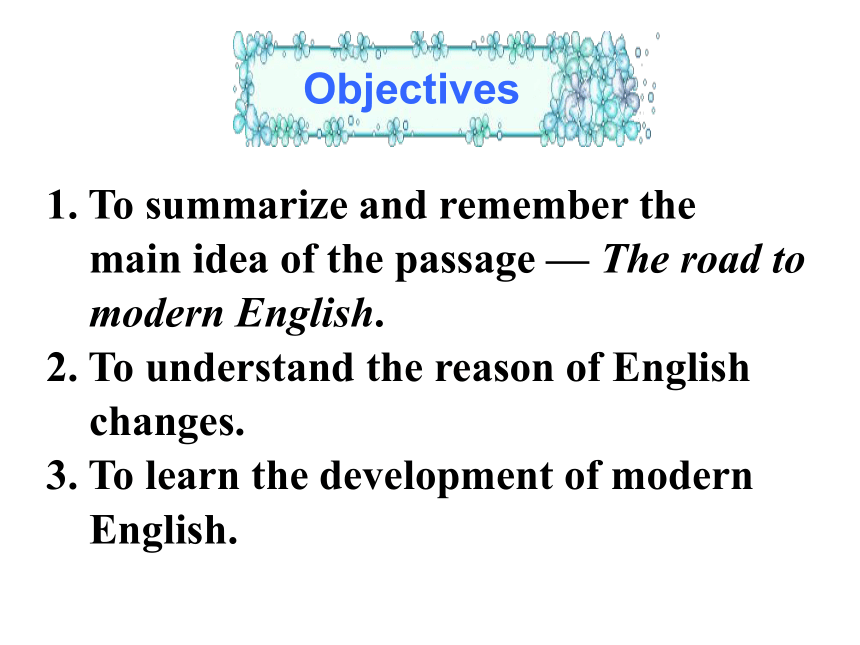

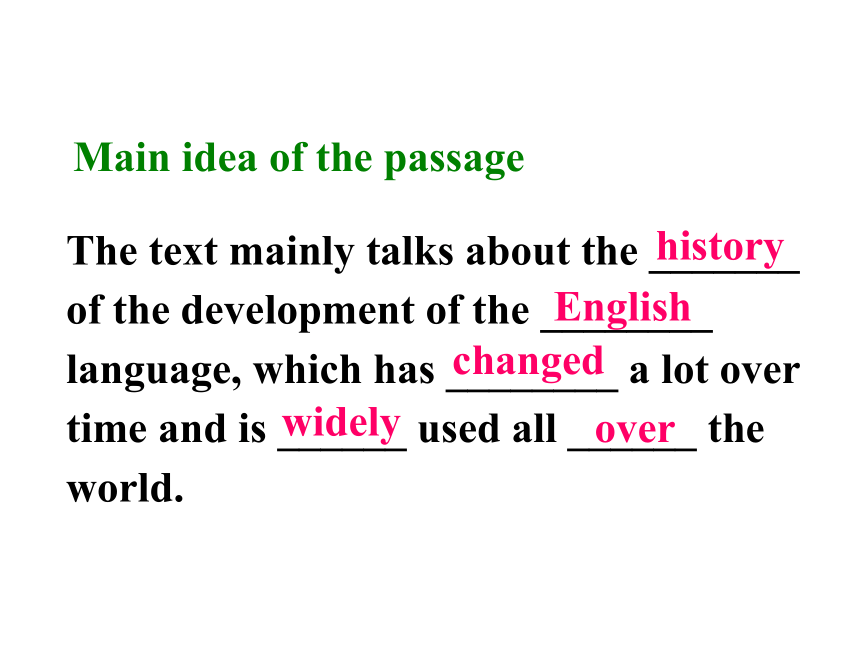
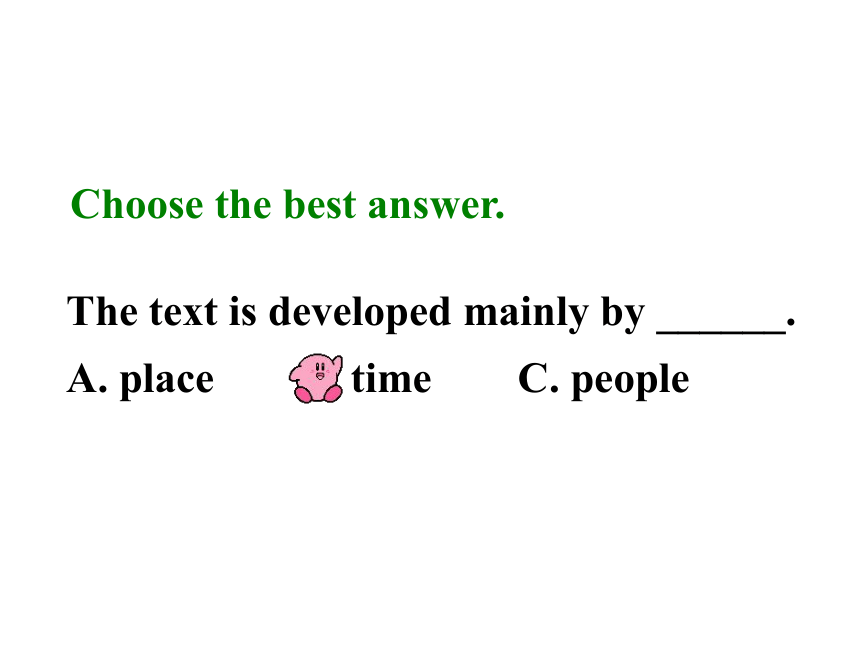
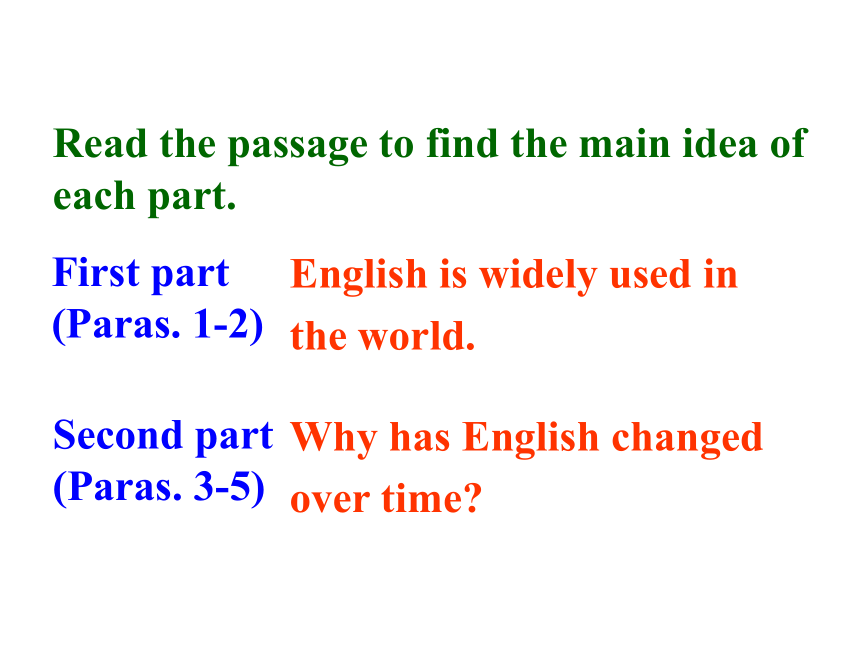


文档简介
课件38张PPT。英语课标教学课件必修1Unit 2English around the worldReadingTHE ROAD TO
MODERN ENGLISHWords Reviewvoyage
conquer
native
apartment
actually
base
gradualn. 航行;航海
vt. 征服;占领
adj. 本国的;本地的
n. 本地人;本国人
n. <美>公寓住宅;单元住宅
adv. 实际上;事实上
vt. 以…...为根据
n. 基部;基地;基础
adj. 逐渐的;逐步的Words Reviewgradually
enrich
vocabulary
spelling
latter
identity
fluent
fluentlyadv. 逐渐地;逐步地
vt. 使富裕;充实;改善
n. 词汇;词汇量;词表
n. 拼写;拼法
adj. 较后的;后半的;
(两者中)后者的
n. 本身;本体;身份
adj. 流利的;流畅的
adv. 流利地;流畅地because of
come up
at present
make use of
such as遇到
现在; 目前
利用; 使用
例如……; 像这种的因为; 由于
走近; 上来; 提出Match1. To summarize and remember the
main idea of the passage — The road to
modern English.
2. To understand the reason of English
changes.
3. To learn the development of modern
English.ObjectivesSkimming for general ideaThe text mainly talks about the _______ of the development of the ________ language, which has ________ a lot over time and is ______ used all ______ the world. historyEnglishchangedwidelyoverMain idea of the passageThe text is developed mainly by ______.
A. place B. time C. peopleChoose the best answer.Read the passage to find the main idea of each part.English is widely used in
the world.First part (Paras. 1-2) Second part (Paras. 3-5) Why has English changed
over time?Scanning for specific information1. From AD 450 to 1150, English sounded more like ________. A. French B. Chinese C. German D. Russian2. By the ______ Shakespeare was able to
use richer vocabulary than ever before.
A. 1400’s B. 1150’s
C. 450’s D. 1600’sChoose the best answer.另附 word 文档链接3. ________ may have the largest number of English learners. A. Australia B. China C. India D. Britain 4. Which of the following statements is true? A. Languages always stay the same. B. Languages change only after wars. C. Languages no longer change. D. Languages change when cultures meet and communicate with each other.True or false1 English had the most speakers in the
17th century.
2 English developed when new settlers and
rulers came to Britain.
3 Languages frequently change.
4 The language of the government is always the language of the country.
5 English is one of the official languages
used in India.
6 This reading describes the development
of the English language.Timeline of the development of EnglishDuring the 5th
century ADBetween about AD 800 and 1150By the 1600s1765 - 19471620From the 18th centuryBy 19th centuryCareful reading重难点句式分析1. At first the English spoken in England
between about AD 450 and 1150 was very different from the English spoken today.
in or at the beginning 起初过去分词短语 用作定语过去分词或过去分词短语作定语时,与所修饰的名词或代词之间存在被动关系。
eg: They are problems left (= which are left) over by history.
它们是历史遗留下来的问题。起初,在公元450年到1150年间,人们所说的英语跟今天所说的英语就很不一样。1. The book bought by my brother yesterday is the same as the book bought by me today.
弟弟昨天买的那本书跟我今天买的这本书一样。2. 广东省说的汉语与山西省说的汉语就很不一样。
The Chinese spoken in Guangdong Province is very different from the Chinese spoken in Shanxi Province.Practice2. Today the number of people learning
English in China is increasing rapidly.
现在分词或现在分词短语做定语时,与所修饰名词或代词之间存在主动关系。
eg: I like the girl sitting on the right.
我喜欢坐在右边的那个女孩。 定语定语目前在中国学习英语的人数正在迅速增长。1. The number of the teachers in our school is about 200.
2. A number of boys like computer games.
我们学校有200名老师。
有许多男孩子喜欢电脑游戏。比一比主语主语islikePractice1. 外国人学习汉语的人数正在迅速增加。
2. 我好多同学有手机。The number of the foreigners learning Chinese is increasing rapidly.
A number of my classmates have mobile phones.Discuss these questions in groups. Group WorkChoose one of the topics below and discuss it with your partners.Discussion1. Why do you think people all over the world want to learn English?As we all know, English is widely used in many fields, while Chinese is spoken by the largest number of speakers. Chinese will become an international language all over the world in the near future. 2. Why do you think more people in
the world now want to learn Chinese?Some people say that Chinese is a
much more elegant language, so it is
more important for us to master it and it is not so necessary to master
foreign language.
Do you agree with
this opinion and why?DebateNow two minutes to test your spelling.Spelling Bee1. English-Chinese
voyage, native, apartment, Danish,
vocabulary, spelling, identity, Singapore,
Malaysia
2. Chinese-English
实际上,逐渐的/地,以…...为根据,
较后的,流利的/地When finished, exchange your papers to see who does the best.Individual activityI. Complete the passage with proper words, which will help you retell the text.另附 word 文档链接At the end of the 16th century, English was only spoken by people ______ (live) in England. They were called native speakers. Later in the next century, people in many other countries began to speak English. Today, the largest number of people speaking English may be in China. Quite a lot of Chinese people speak English ____ a foreign language.livingasSo far the English language ____________
(change) a lot. Old English sounded more or less like German for it was ______ (base) on German, but modern English sounds more like French than German ________ England was once ruled by the France.
By the 19th century, the language was ______ (final) settled. At that time two people had great effects ____ the English changes. One was Samuel Johnson, _____ wrote his dictionary; _____ other was Noah Webster, who wrote a dictionary, ______ gave a separate identity to American English spelling. has changedbasedbecausefinallyonwhothewhichII. Task-based reading.Answer the question.What’re the differences between American English and British English? Spelling, use of the present perfect, possession, prepositions, vocabulary and the pronunciation. 另附 word 文档链接Self-assessmentThink about what we’ve just learnt today.Time for Reflection Study without reflection is a waste of time.Think in English After the classIt’s time to stop the class for us to look back in silence.1. Write a short passage about your
own learning experience and
ideas about English learning.native, come up, actually, at present, gradual, spelling, latter, identity, fluent, such as.2. 发挥想象,连词成文(50-100字)。Homework3. Try to retell the text by using the key words below:
During the 5th century AD → Between about AD 800 and 1150 →
By the 1600s → 1620 →
From the 18th century →
1765 - 1947 → By 19th century4. Read the articles in page 1 of Learning English. The more you read, the faster and better you’ll understand. When finished reading, write a summary in 100 words or so.
5. Read the following passage and
copy it into your notebook. Pay
attention to the coloured words.About 30 years ago, I left Cuba for the United States with my son. After getting settled finally in Brunswick, New Jersey, I enrolled (注册) my son in kindergarten. Several weeks later, my son’s teacher asked me to meet him at his office.
In the teacher’s office, and exchange of greetings was followed by his questions: “Is your son mentally retarded (弱智的)?Does he suffer from any kind of mental disability?”
Was he talking about my wonderful Scola? No, no, it can’t be. What a helpless, lonely moment! I told him that Scola was a quiet, sweet little boy, instead. I asked him why he was asking me all these questions.
My son could not follow the teacher’s directions, he told me, and thus, Scola was disrupting the class. Didn’t he know my son did not speak English yet?
He was angry; “Why hasn’t your son been taught to speak English? Don’t you speak English at home?”No, I didn’t speak English at home, I replied. I was sure my son would learn English in a couple of months, and I didn't want him to forget his native language. Well, wrong answer! What kind of person would not speak in English to her son at home and at all time? “Are you one of those people who come to this country to save dollars and send them back to their country, never wanting to be a part of this society?”
Needless to say, I tried to tell him I was not one of “those people.” Then he told me the meeting was over, and I left.
As I had expected, my son learned to speak English fluently before the school year was over. He went on to graduate from college and got a job, earning close to six figures. He travels widely and leads a well-adjusted, contented life. And he has benefited from being bilingual (双语的).
Speaking more than one language allows people to communicate with others; it teaches people about other cultures and other places — something very basic and obviously lacking in the “educator” I met in New Jersey.
MODERN ENGLISHWords Reviewvoyage
conquer
native
apartment
actually
base
gradualn. 航行;航海
vt. 征服;占领
adj. 本国的;本地的
n. 本地人;本国人
n. <美>公寓住宅;单元住宅
adv. 实际上;事实上
vt. 以…...为根据
n. 基部;基地;基础
adj. 逐渐的;逐步的Words Reviewgradually
enrich
vocabulary
spelling
latter
identity
fluent
fluentlyadv. 逐渐地;逐步地
vt. 使富裕;充实;改善
n. 词汇;词汇量;词表
n. 拼写;拼法
adj. 较后的;后半的;
(两者中)后者的
n. 本身;本体;身份
adj. 流利的;流畅的
adv. 流利地;流畅地because of
come up
at present
make use of
such as遇到
现在; 目前
利用; 使用
例如……; 像这种的因为; 由于
走近; 上来; 提出Match1. To summarize and remember the
main idea of the passage — The road to
modern English.
2. To understand the reason of English
changes.
3. To learn the development of modern
English.ObjectivesSkimming for general ideaThe text mainly talks about the _______ of the development of the ________ language, which has ________ a lot over time and is ______ used all ______ the world. historyEnglishchangedwidelyoverMain idea of the passageThe text is developed mainly by ______.
A. place B. time C. peopleChoose the best answer.Read the passage to find the main idea of each part.English is widely used in
the world.First part (Paras. 1-2) Second part (Paras. 3-5) Why has English changed
over time?Scanning for specific information1. From AD 450 to 1150, English sounded more like ________. A. French B. Chinese C. German D. Russian2. By the ______ Shakespeare was able to
use richer vocabulary than ever before.
A. 1400’s B. 1150’s
C. 450’s D. 1600’sChoose the best answer.另附 word 文档链接3. ________ may have the largest number of English learners. A. Australia B. China C. India D. Britain 4. Which of the following statements is true? A. Languages always stay the same. B. Languages change only after wars. C. Languages no longer change. D. Languages change when cultures meet and communicate with each other.True or false1 English had the most speakers in the
17th century.
2 English developed when new settlers and
rulers came to Britain.
3 Languages frequently change.
4 The language of the government is always the language of the country.
5 English is one of the official languages
used in India.
6 This reading describes the development
of the English language.Timeline of the development of EnglishDuring the 5th
century ADBetween about AD 800 and 1150By the 1600s1765 - 19471620From the 18th centuryBy 19th centuryCareful reading重难点句式分析1. At first the English spoken in England
between about AD 450 and 1150 was very different from the English spoken today.
in or at the beginning 起初过去分词短语 用作定语过去分词或过去分词短语作定语时,与所修饰的名词或代词之间存在被动关系。
eg: They are problems left (= which are left) over by history.
它们是历史遗留下来的问题。起初,在公元450年到1150年间,人们所说的英语跟今天所说的英语就很不一样。1. The book bought by my brother yesterday is the same as the book bought by me today.
弟弟昨天买的那本书跟我今天买的这本书一样。2. 广东省说的汉语与山西省说的汉语就很不一样。
The Chinese spoken in Guangdong Province is very different from the Chinese spoken in Shanxi Province.Practice2. Today the number of people learning
English in China is increasing rapidly.
现在分词或现在分词短语做定语时,与所修饰名词或代词之间存在主动关系。
eg: I like the girl sitting on the right.
我喜欢坐在右边的那个女孩。 定语定语目前在中国学习英语的人数正在迅速增长。1. The number of the teachers in our school is about 200.
2. A number of boys like computer games.
我们学校有200名老师。
有许多男孩子喜欢电脑游戏。比一比主语主语islikePractice1. 外国人学习汉语的人数正在迅速增加。
2. 我好多同学有手机。The number of the foreigners learning Chinese is increasing rapidly.
A number of my classmates have mobile phones.Discuss these questions in groups. Group WorkChoose one of the topics below and discuss it with your partners.Discussion1. Why do you think people all over the world want to learn English?As we all know, English is widely used in many fields, while Chinese is spoken by the largest number of speakers. Chinese will become an international language all over the world in the near future. 2. Why do you think more people in
the world now want to learn Chinese?Some people say that Chinese is a
much more elegant language, so it is
more important for us to master it and it is not so necessary to master
foreign language.
Do you agree with
this opinion and why?DebateNow two minutes to test your spelling.Spelling Bee1. English-Chinese
voyage, native, apartment, Danish,
vocabulary, spelling, identity, Singapore,
Malaysia
2. Chinese-English
实际上,逐渐的/地,以…...为根据,
较后的,流利的/地When finished, exchange your papers to see who does the best.Individual activityI. Complete the passage with proper words, which will help you retell the text.另附 word 文档链接At the end of the 16th century, English was only spoken by people ______ (live) in England. They were called native speakers. Later in the next century, people in many other countries began to speak English. Today, the largest number of people speaking English may be in China. Quite a lot of Chinese people speak English ____ a foreign language.livingasSo far the English language ____________
(change) a lot. Old English sounded more or less like German for it was ______ (base) on German, but modern English sounds more like French than German ________ England was once ruled by the France.
By the 19th century, the language was ______ (final) settled. At that time two people had great effects ____ the English changes. One was Samuel Johnson, _____ wrote his dictionary; _____ other was Noah Webster, who wrote a dictionary, ______ gave a separate identity to American English spelling. has changedbasedbecausefinallyonwhothewhichII. Task-based reading.Answer the question.What’re the differences between American English and British English? Spelling, use of the present perfect, possession, prepositions, vocabulary and the pronunciation. 另附 word 文档链接Self-assessmentThink about what we’ve just learnt today.Time for Reflection Study without reflection is a waste of time.Think in English After the classIt’s time to stop the class for us to look back in silence.1. Write a short passage about your
own learning experience and
ideas about English learning.native, come up, actually, at present, gradual, spelling, latter, identity, fluent, such as.2. 发挥想象,连词成文(50-100字)。Homework3. Try to retell the text by using the key words below:
During the 5th century AD → Between about AD 800 and 1150 →
By the 1600s → 1620 →
From the 18th century →
1765 - 1947 → By 19th century4. Read the articles in page 1 of Learning English. The more you read, the faster and better you’ll understand. When finished reading, write a summary in 100 words or so.
5. Read the following passage and
copy it into your notebook. Pay
attention to the coloured words.About 30 years ago, I left Cuba for the United States with my son. After getting settled finally in Brunswick, New Jersey, I enrolled (注册) my son in kindergarten. Several weeks later, my son’s teacher asked me to meet him at his office.
In the teacher’s office, and exchange of greetings was followed by his questions: “Is your son mentally retarded (弱智的)?Does he suffer from any kind of mental disability?”
Was he talking about my wonderful Scola? No, no, it can’t be. What a helpless, lonely moment! I told him that Scola was a quiet, sweet little boy, instead. I asked him why he was asking me all these questions.
My son could not follow the teacher’s directions, he told me, and thus, Scola was disrupting the class. Didn’t he know my son did not speak English yet?
He was angry; “Why hasn’t your son been taught to speak English? Don’t you speak English at home?”No, I didn’t speak English at home, I replied. I was sure my son would learn English in a couple of months, and I didn't want him to forget his native language. Well, wrong answer! What kind of person would not speak in English to her son at home and at all time? “Are you one of those people who come to this country to save dollars and send them back to their country, never wanting to be a part of this society?”
Needless to say, I tried to tell him I was not one of “those people.” Then he told me the meeting was over, and I left.
As I had expected, my son learned to speak English fluently before the school year was over. He went on to graduate from college and got a job, earning close to six figures. He travels widely and leads a well-adjusted, contented life. And he has benefited from being bilingual (双语的).
Speaking more than one language allows people to communicate with others; it teaches people about other cultures and other places — something very basic and obviously lacking in the “educator” I met in New Jersey.
